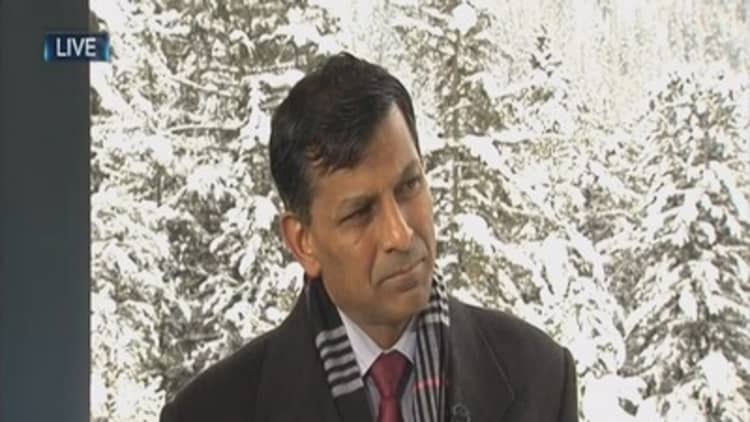
Traders worried by the global slump in stocks on Wednesday received some reassuring words from the head of India's central bank.
Raghuram Rajan, the governor of the Reserve Bank of India since 2013, told CNBC that one reason for the tumult in markets was "jitters about jitters."
"I think one is jitters — everybody is looking at everybody else and saying 'Is this the point where they take the money off the table?' — because markets have moved up quite a bit. So that's part of it," he told CNBC on Wednesday.
"Part of it is wondering what is really happening in China: Why did the renminbi start moving a little and is there more to come? And, of course, the oil price; how far will it go and does it affect some entity, some lever entity somewhere, which has oil exposure, and does that create problems?
"So I think some jitters are really jitters about jitters and some are really wondering about fundamentals."
India's SENSEX equity index closed down around 1.7 percent on Wednesday, as U.S. light crude oil prices slumped to 13-year lows below $28 per barrel, hitting global risk sentiment.
Rajan said that broadly, the fundamentals of the world economy did not justify the decline in asset prices.
"Of course, it's hard to tell what the right level for asset prices is, but is there something that changed dramatically over the last few weeks that would say the world economy is heading downwards? I don't think so. In fact, there is a fair amount of sense that, yes, we're trudging along more slowly than we should, but it's not the abyss that we're looking at," he told CNBC.
On Tuesday, the International Monetary Fund cuts it global growth outlook for 2016 and 2017, to 3.4 percent and 3.6 percent respectively.
However, the body held its forecast for Indian economic growth at 7.5 percent in both 2016 and 2017. This was a slight uptick on growth of 7.3 percent per annum in 2014 and 2015.
By contrast, Chinese economic growth has slowed steadily since 2010. India's growth overtook that of China last year and is seen diverging further in 2016 and 2017, when the Chinese economy is seen expanding by 6.3 percent and 6.0 percent respectively.
"My sense is, at this point, if you are an emerging market, you focus on the fundamentals: Try and get inflation down, try and get your current account deficit down; keep your fiscal on target; do all the good things and then people reward you. They take the money off the table in a hurry when they are doing it everywhere, but then they come back," Rajan told CNBC.
"So my sense is that after the initial volatility, things will stabilise, people will try and look for the good, stable emerging markets. India is one of them. Our growth is pretty good, all the other indicators seem to be going well," he added.
This month, PwC said that India would be the "star performer" out of the major emerging economies.
"The cut in the policy rate by the Central Bank of India from 8 percent to 6.75 percent last year will help to support consumption and investment growth this year," the financial services firm said in a report on the global economy.
"Foreign direct investment in India's underdeveloped manufacturing sector should also pick up as foreign investment caps have mostly been lifted."
Rajan will speak again at 2:30 p.m. local time in Davos on Wednesday, as part of a conference on "The Growth Illusion." Other speakers at the conference include UBS Chairman Axel Weber, who was previously president of the Deutsche Bundesbank.








